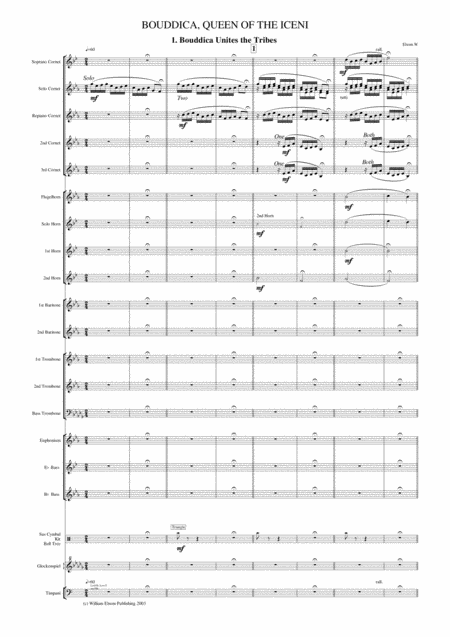Brass Ensemble - Level 3 - Digital Download SKU: A0.1027894 Composed by William Elsom. Contemporary. Score and parts. 46 pages. Will Elsom #3053855. Published by Will Elsom (A0.1027894). Programme Notes Boudicca became the Queen of the Iceni upon the death of her husband, Prasutagus. The Iceni had lived in relative peace with the Romans, with Prasutagus living as a client king, paying tribute to Rome. The Romans refused to accept a woman as the ruler, and sought to assume total control. To demonstrate its superiority, a Roman Legion attacked the Iceni, captured Boudicca and made her watch as her daughters were raped. She sought revenge, allying the Iceni with the Trinovantes under her command, and wreaked havoc, destroying many Roman settlements. Boudicca was only stopped when Rome sent one of the best generals of the time, Seutonius Paulinus. Seutonius has been depicted offering Boudicca surrender with honour and her life, but when she rejected this, his tactical acumen proved superior, and all the Iceni and Trinovantes were wiped out. 1 – Boudicca Unites the Tribes The piece opens with the initial statement of Boudicca’s theme. Figure 3 depicts Boudicca’s reign as the leader of the Iceni, interspersed with a sadder theme depicting her lonely widowhood. Figure 4 sees the tribes called together with a drinking song and Figure 5 is the war cry, as Boudicca gives a rousing speech, first to her own warriors then to the Trinovantes. The second time bar before Figure 7 sees the tribes fall into a restless sleep. Amid early morning mists, Figure 7 sees restless horses, with distant fanfares heard, signalling the coming of the Romans. The Romans main theme is at Figure 8, with a constant fanfare over the top, signalling the confidence of the leaders. Figure 10 sees the Iceni and Trinovantes coming slowly out of hiding, and Boudicca’s theme growing in volume until the death chords signify the tribes have prevailed. 2. The Bards Sing The tribes sing a hymn to an unnamed Pagan God. At Figure 13, the Euphonium develops Boudicca’s theme depicting Taranis, the Bard of the Iceni, singing wistfully of happier times. He then makes an impassioned speech for peace, before cutting off in mid sentence. He then sits quietly (Figure 16) fearing the future. Figure 17 gives a euphoric and hopeful rendition of the hymn, as if Taranis has not been heard. 3 – Epping NB: It is my piece, and I say Epping is as credible as anywhere as the site of the final battle, and will not enter into any correspondence on the matter! A fanfare awakens the two tribes. Figure 18 sees the tribes prepare for a final battle, and the repeated section depicts two victories at Verulanium (St Albans) and Londinium (London – then a small barracks). At Figure 20 Taranis has a vision, and tries to change Boudicca’s mind about another attack. Boudicca listens to him, but tells him the die is cast, and there is no going back. Death or Glory… The war cry ensues at Figure 21, but at Figure 22 it is the Romans’ theme heard, and the death chords (Figure 24) signify that it is the two tribes that are being slaughtered this time. Brave souls (Repiano and Flugel at 24) fight on in vain to allow Boudicca to escape. At Figure 25 Boudicca prays, but realising all is lost, at Figure 26 drinks poison. As she dies, the last thing this brave British heroine hears is the sound of the Roman’s theme, signifying Seutonius’ total victory. William Elsom, December 2004
